Econsultancy’s expert team of analysts have continued their sterling work this year, and to highlight some of their excellent research I’ve rounded up a load of interesting stats from our Q2 reports.
Yes, I am aware that Q2 ended more than a month ago, but the saying “better late than never” is my guiding principle with this post.
It includes data on customer lifetime value, mobile optimisation, paid search, big data, mobile commerce and the UK’s top digital agencies.
This by no means includes all of the reports published by Econsultancy this year, so head here to explore our full range.
Measuring customer lifetime value (CLV)
Econsultancy’s Building Loyalty and Driving Revenue in the Digital Age report looks at the difficult issue of measuring customer lifetime value (CLV).
It found that though the vast majority of respondents agree that CLV is an important concept, only 42% said they are able to measure it.
89% see customer experience as a key factor in driving customer loyalty and retention, while 76% see CLV as an important concept for their organisation.
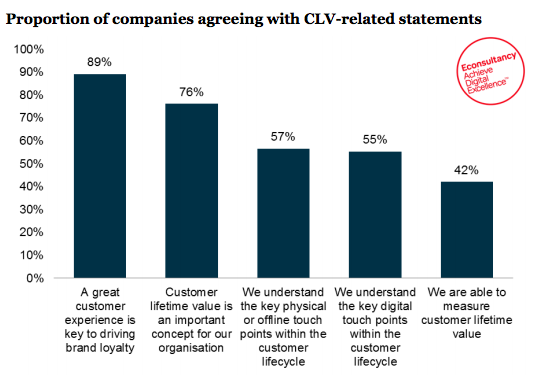
One of the challenges is that many organisations simply aren’t set up to manage lifetime value, with 35% of respondents saying that the siloed nature of their organisations and lack of coherent marketing hinders their ability to increase CLV.
The report is based on a survey of 900 agency and company respondents.
Marketers have responsibility for mobile optimisation
Only a third of businesses (36%) agree that they have a mobile strategy compared to 45% who disagree, according to the Finding the Path to Mobile Maturity Briefing.
Much of the responsibility apparently lies with marketing departments.
Both company and agency respondents indicated that marketing departments are most likely to be in charge of mobile (58% & 60%), followed by development/IT (39% & 40%) and ecommerce teams (29% & 28%).
Who is directly responsible for mobile optimisation within your/your clients’ organisation(s)?
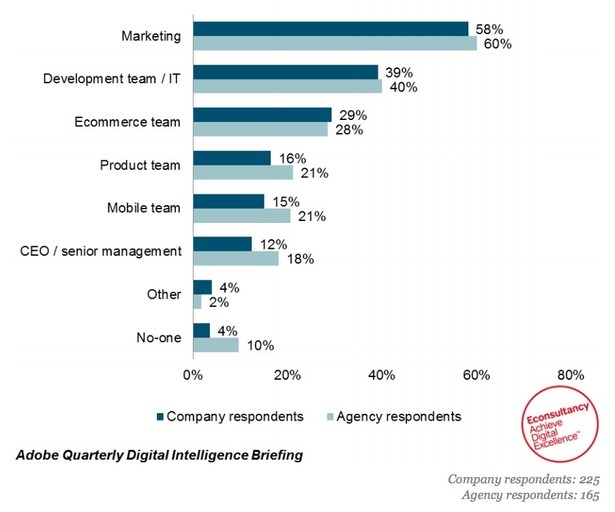
The report is based on a global survey of 600 client-side and agency marketers carried out in March and April 2014.
Southeast Asia could be the next big ecommerce opportunity
China is a very attractive market for businesses seeking to expand globally, but it would be wise not to overlook the opportunity presented by other nations in APAC.
The Econsultancy/Hybris State of Ecommerce in South-East Asia report shows that ASEAN nations currently account for 9.6% of the APAC online population, a figure which is obviously dwarfed by China (54%) but at 62m people it’s not an insignificant market.
There are also strong indicators of the huge potential for ecommerce in the next few years. For example, just under three-quarters (73%) of Singapore’s population is presently connected to the internet, one of the highest in the region.
ComScore data on Southeast-Asian online audience growth

Similarly, Taiwan has the deepest social media penetration rate in the region at 69%. This is followed by Brunei, Hong Kong, and Singapore at 67%, 61% and 59% respectively.
To put this in context, the average rate of social media penetration across the whole of Asia is 35%, so ASEAN nations are ahead of the curve.
SapientNitro is top digital agency
The 100 largest UK digital agencies have increased their annual fee income by 23% to £1.48bn, according to the Top 100 Digital Agencies Report.
For the equivalent 2013 report, the same 100 agencies had reported combined fee income of £1.2bn for the previous accounting period.
The research also found that creative activities drive the largest share of agency fee income, accounting for an average of 21% of fees for agencies working in this area. This was followed by technical development (19%).
SapientNitro came top of the list, billing £142m in fiscal year 2013/13. IBM Interactive Experience came second with £122m, followed by DigitasLBi on £61m.
Enhanced Campaigns are a dubious success
The impact of Google’s switch to Enhanced Campaigns for PPC hasn’t been hugely positive, according to the UK Search Engine Marketing Benchmark Report 2014.
Only 14% of companies say that Enhanced Campaigns have had a positive effect on paid search marketing, mostly due to improvements to mobile search.
Meanwhile, a quarter of responding companies say impact has been non-existent and more than half (53%) are still yet to make their mind with regards to the service.
What impact has Google’s introduction of Enhanced Campaigns had on your/your clients’ paid search marketing?
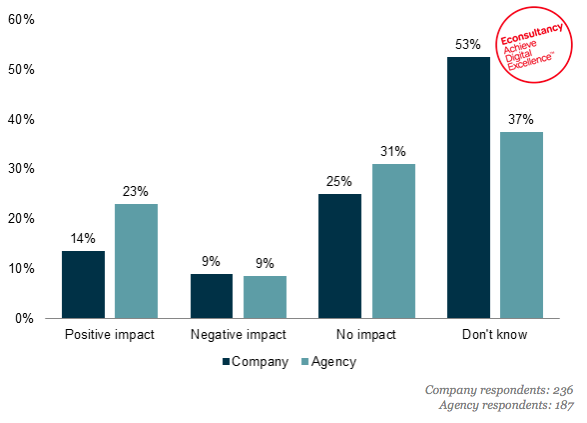
The report also examines how companies allocate their budgets for different marketing channels.
Only 13% of responding companies have marketing budgets that are rigidly split by channel. This is good news given the increasingly integrated and agile nature of effective marketing.
The majority of companies either have flexibility to shift budget across channels based on ROI (43%) or have no channel splits in their digital marketing budget (44%).
What does big data actually mean?
There has been a lot of excitement around big data in the past few years, but has it had any real impact on marketing teams?
In our Measurement and Analytics Report 2014 respondents were asked whether they agreed or disagreed (or were neutral) about a number of statements relating to big data.
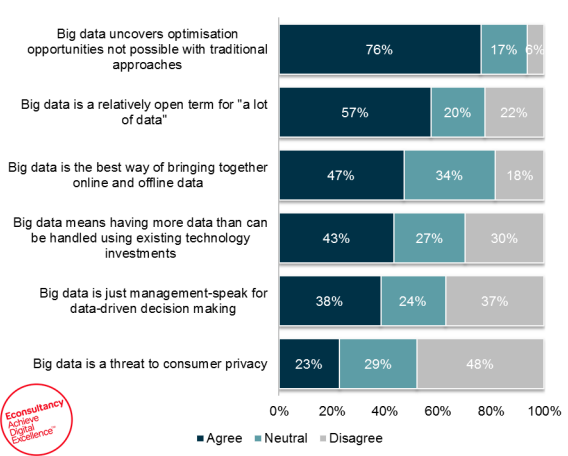
The results suggest a positive sentiment towards big data, with 76% agreeing that it has uncovered optimisation opportunities which would not otherwise have been possible, while 47% see it as the best way of bringing online and offline data together.
Mobile commerce is a key focus in Australia and New Zealand
Mobile commerce will be a key focus for four out of five organisations in Australia and New Zealand over the next three years.
The State of Ecommerce in Australia and New Zealand report, published by Econsultancy in partnership with Hybris, found that more than two-thirds (69%) of businesses in the region are planning to increase investment in mobile-optimised transactional websites.
In which areas will you be increasing investment in the next three years?
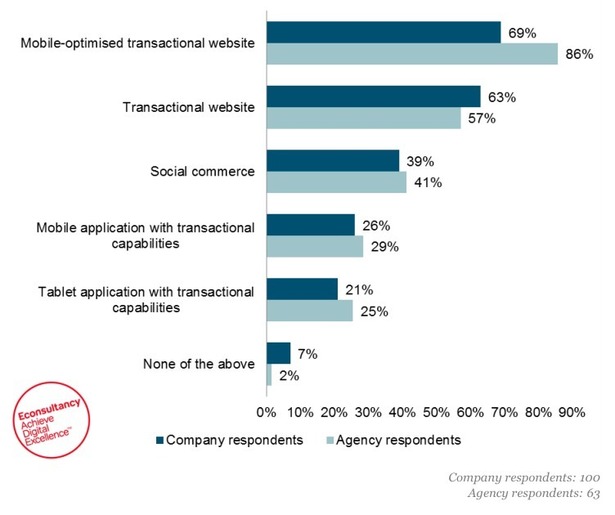
On average, client-side respondents indicated they are planning to increase investment in ecommerce technology by 41%.
Asked about the most significant challenges to growing an ecommerce business, lack of budget and resources emerged as the most common problem, cited by 59% of company respondents.
The report is based on a survey of around 200 marketers and agencies, plus interviews with a range of digital marketing and ecommerce practitioners.
What are the essential skills for modern marketers?
Finally, here is an infographic that includes some of the more interesting results from our Skills of the Modern Marketer Report, which defines the skills that senior marketers are seeking for their team.
Enjoy!


















No Comments